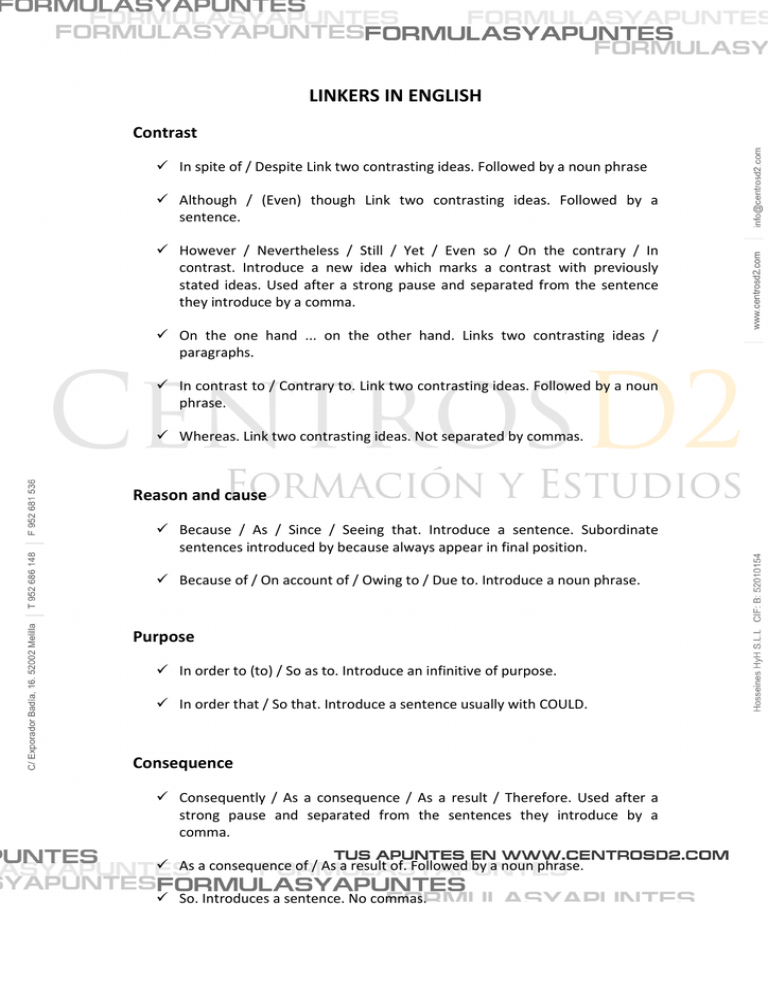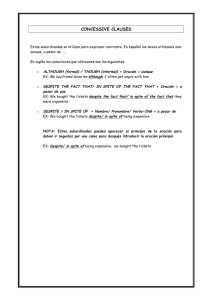linkers in english
Anuncio

LINKERS IN ENGLISH Contrast In spite of / Despite Link two contrasting ideas. Followed by a noun phrase Although / (Even) though Link two contrasting ideas. Followed by a sentence. However / Nevertheless / Still / Yet / Even so / On the contrary / In contrast. Introduce a new idea which marks a contrast with previously stated ideas. Used after a strong pause and separated from the sentence they introduce by a comma. On the one hand ... on the other hand. Links two contrasting ideas / paragraphs. In contrast to / Contrary to. Link two contrasting ideas. Followed by a noun phrase. Whereas. Link two contrasting ideas. Not separated by commas. Reason and cause Because / As / Since / Seeing that. Introduce a sentence. Subordinate sentences introduced by because always appear in final position. Because of / On account of / Owing to / Due to. Introduce a noun phrase. Purpose In order to (to) / So as to. Introduce an infinitive of purpose. In order that / So that. Introduce a sentence usually with COULD. Consequence Consequently / As a consequence / As a result / Therefore. Used after a strong pause and separated from the sentences they introduce by a comma. As a consequence of / As a result of. Followed by a noun phrase. So. Introduces a sentence. No commas. Addition Moreover / Furthermore / In addition / Besides / What's more. Used after a strong pause and separated from the sentences. They are introduced by a comma. As well as / In addition to / Besides. Used to add one more piece of information. Followed by a noun phrase. Exemplification For example / For instance. Introduces an example referring to previously stated ideas. Such as Introduces an example referring to the last idea/word A) CONECTORES QUE EXPRESAN CONTRASTE U OPOSICIÓN DE IDEAS but / yet: tienen el mismo sentido, indican contraste y van seguidos tanto de un grupo nominal como de una oración. ‘The book is short but / yet interesting’ in spite of / despite: tienen el mismo significado ( a pesar de, sin embargo). ‘He arrived on time despite / in spite of getting up late’ although / though/ even though / in spite of the fact that: tienen el mismo significado (aunque). Van seguidos por una oración completa y pueden ir al principio o en medio de una frase (si el conector comienza la oración, se debe poner una coma para separar las ideas que queremos contrastar) ‘Although / though / even though / in spite of the fact that the pupils had not studied as hard as they could, they all passed their exams’. however, nevertheless, even so, on the one hand, on the other hand, on the contrary: van seguidos en primer lugar por una coma y después por una oración completa. ‘She was quite ill however/ nevertheless/ even so, she went to school’ while, whereas tienen el mismo significado y van seguidos por una oración completa. ‘This soap is very interesting, while/whereas that one is quite boring’ B) CONECTORES QUE EXPRESAN RAZÓN, CAUSA, PROPÓSITO because, as since, seeing that: tienen todos el mismo significado y van seguidos de una oración completa. ‘Because / as / since / seeing that it’s late, we should all go home’ because of, on account of, owing to, due to: tienen el significado de porque o razón por la que. Van seguidos de un grupo nominal. Si comienzan la frase, ambas oraciones irán separadas por coma. ‘Because of / on account of / owing to / due to the weather, we stayed at home’ in order to, so as to, to: expresan propósito. Van seguidos de la raíz del verbo. Por el contrario in order that y so that van seguidos de una oración con verbo modal. ‘She uses her video in order to / so as to / to record a show’ C) EXPRESIONES DESTINADAS A AÑADIR INFORMACIÓN for example, for instante, such as: pueden expresarse indistintamente. ‘Vegetables are a good source of vitamins: for example / for instance,pepper has vitamin C’ more over, furthermore, besides, in addition to: se utilizan para añadir más información y van seguidas de coma. Significan “también” ‘In addition to classical music, she likes jazz’ apart from, except for: se emplean para indicar que algo es una excepción a la idea general expresada en la frase. ‘Apart from English, she speaks three other foreign languages’. D) EXPRESIONES QUE INDICAN SUCESIÓN Y RESULTADO DE ACCIONES Se emplean una serie de expresiones que indican sucesión de hechos para ordenar lo que se está diciendo - First of all / firstly / to begin with / first …. Second / secondly / then … The next stage … Finally / in short / to sum up / in conclusion / lastly / last but not least… Therefore, as a result, consequently, for this reason: señalan la conexión entre la acción y su resultado. Van seguidos por una oración completa. ‘Consequently / for this reason, it always passes its annual road test’. As a result of: tiene el mismo sentido que los anteriores, pero va seguido de un grupo nominal, no de una oración. ‘As a result of his brave action, he was awarded a military meda'l.
